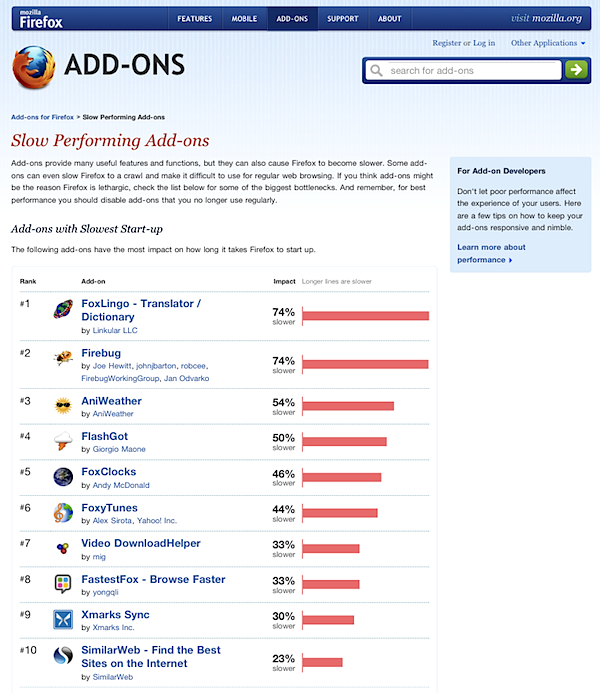Can Mozilla shame Firefox developers to do better?
I sure hope so. Mozilla has posted what Stan Schroeder, writing for Mashable, calls a "Wall of Shame." Firefox users, is this new? I'm just getting back to using Firefox after more than a year -- part of my experiment to purge all Google products and services; I haven't followed Firefox enough recently to answer. New or not, it's a simply brilliant idea. Apple, Google, Microsoft, Opera any other browser developers should copycat this one.
Praise is the carrot. Shame is the stick. Browser makers should use both -- or at least look to see how the stick works for Firefox. Mozilla's main list is 10 "Slow Performing Add-ons," but there are another 40 available to view. The poster-application for good behavior is add-on Firefox Sync, which doesn't slow performance at all. Linkular's FoxLingo - Translator / Dictionary tops the list, slowing the browser's performance by 74 percent. Firebug ranks second, also saps by 74 percent.
Based on past comments, I presume that Adblock Plus is popular among Betanews readers. Some of you might want to reconsider the benefits. The Add-on ranks twelfth on Mozilla's list, slowing Firefox performance by 21 percent. StumbleUpon is No. 14, for a 19 percent hit.
What's perplexing is what's not in the top 50: Adobe Flash. The plug-in has such a bad reputation for hogging resources, I'm surprised. Is it's reputation undeserved, or is it not on the list for other reasons? Readers, please pipe in about Flash performance -- in comments, of course.

Mozilla offers a "Performance best practices in extensions" primer for developers. For example: "Extensions are loaded and run whenever a new browser window opens. That means every time a window opens, your extension can have an impact on how long it takes the user to see the content they're trying to view." Developers can minimize startup slowdowns:
- Only loading what the user needs at startup.
- Use JavaScript to incorporate "sets of features that are only needed under specific circumstances."
- "Most extensions have a load event listener in the main overlay that runs their startup functions. Do as little as possible here. The browser window is blocked while your add-on's load handler runs."
Mozilla also offers tips about writing good CSS, reducing file I/O and removing event listeners.
I love the hall-of-shame concept but believe there should be a Hall of Fame, too. Give developers two lists to aspire to -- the one they want to be on and the one they don't. As I expressed in the opening paragraph, other browser developers should imitate this one. Heck, Apple, Google, Microsoft and Research in Motion should have similar "bad apps" lists for their mobile operating systems, too. I wonder, does Microsoft have such a list for Windows? If not, it's time to start. The company has long rightly complained about third-party applications causing performance problems (and I'd contend some Microsoft apps, too).
Platforms are only as good as their applications. Platform developers should publicly hold app developers accountable. There already are silent mechanisms, such as the crash reports platform developers collect. Making performance information public is a simply outstanding idea. Kudos to Mozilla.
Is there a slow-performing add-on you'd like to out? Please answer in comments.